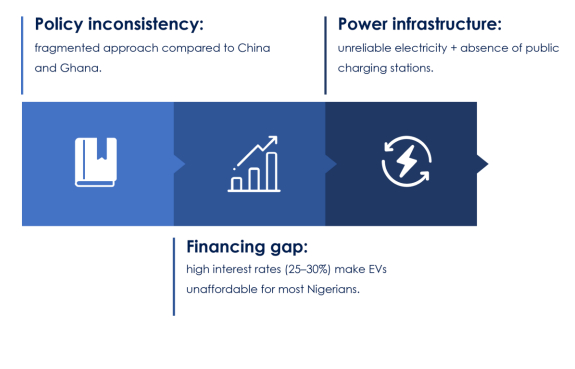- within Transport topic(s)
- in Africa
- in Africa
- in Africa
- in Africa
- within Transport, Finance and Banking and Antitrust/Competition Law topic(s)
- with readers working within the Banking & Credit and Law Firm industries
Introduction
The phrase "the new three" has become increasingly common in global clean energy discourse, particularly in relation to how China, the world's largest electric vehicle ("EV") player,1 has combined solar technology, battery manufacturing, and EVs into becoming core export drivers. So, when on 19 May 2025, Dr. Dele Alake, Honourable Minister of Solid Minerals Development of Nigeria, announced that China had plans to establish EV factories in Nigeria, it became apparent that it was not merely as a result of the hope to deepen bilateral relations between Nigeria and China, but an emphatic signal of investor confidence in Nigeria's growing relevance, as a frontier market for sustainable transportation and green industrialisation. And why not?
EVs provide a clean, efficient, and progressively affordable option compared to conventional internal combustion engine vehicles that operate on fossil fuels. Unfortunately, despite their rapidly growing global acceptance, in Nigeria, where escalating fuel prices and environmental issues are driving changes in consumer behaviour, their significance and popularity have remained nascent.
This article examines Nigeria's existing legal and policy framework for EV infrastructure, discusses existing fiscal incentives for investors and highlights Nigeria's advantageous position as an investor's dream destination and potential regional leader in EV manufacturing and export.
Development of Electric Vehicles in Nigeria
Although the adoption of EVs in Nigeria has been gradual, recent years have seen the emergence of EV charging stations in major cities such as Lagos and Abuja.2 This trend points to a growing interest and a market that is becoming more open to clean transportation options, driven by both economic pragmatism and environmental imperatives.
In 2021, an important milestone was reached when the Stallion Group rolled out Nigeria's first locally assembled EV (the Hyundai Kona), through its automotive subsidiary, Stallion Motors. This marked the beginning of formal EV assembly in Nigeria and drew attention to the viability of local clean energy vehicle production. Since then, companies like Electric Motor Vehicle Company,3 Innoson Vehicle Manufacturing Company,4 and Jet Motor Company,5 amongst others, have emerged. These companies have been engaged in the design, testing, and deployment of electric vehicles specifically tailored to suit Nigeria's road conditions and circumstances.
Although these developments have not led to a boom in the industry, they highlight the case for Nigeria's readiness for a bigger role in EV production, due to its natural endowment in lithium, a critical mineral used in the manufacture of EV batteries.6 Thus, policy direction is shifting from solely raw mineral extraction, towards the development of a full domestic lithium value chain for battery and EV production.
Challenges Holding Back EV Growth in Nigeria

Challenges and Risks in Electric Vehicle Development in Nigeria
Nigeria's push towards electric mobility presents a transformative opportunity for investors and businesses seeking to lead in a new era of sustainable transportation. However, this path to EV adoption has been fraught with certain challenges and risks, some of which are summarised below:
a) Policy Inconsistency
Although Nigeria possesses significant lithium resources, the presence of raw materials alone is insufficient to ensure the development of any industry. In China, for example, the government has long played an important role by creating increased opportunities for both the supply and demand of EVs, through generous government subsidies, tax breaks, procurement contracts, and other policy incentives.7 Similarly, Ghana, while smaller in scale, is taking a fairly structured and policy-led approach through its 2024 National Electric Vehicle Policy and a comprehensive roadmap targeting significant EV deployment by 2050.8
These situations are in sharp contrast to Nigeria's policy history, where there has been some inconsistency, with notable shifts in direction over the years, thus denying the sector of sustained regulatory coherence,9 undermining investor confidence and deterring long-term industrial growth. Initially, there was the introduction of a National Automotive Policy in 1993, which sought to promote local manufacturing, using indigenous resources.10 This was followed by the first launch of the National Automotive Industry Development Plan (the "Automotive Plan") in 2013, signalling a more ambitious attempt to revive the industry and lead to increased local assembly activities and licensing of new entrants11. Later in 2023, the National Automotive Design and Development Council (NADDC) issued an updated 2023 Automotive Plan,12 which was approved by the Federal Executive Council.13
The evolution of sector policy in Nigeria, despite its ups and downs, appears to have reached a significant and promising stage, with the release of the 2023 Automotive Plan. This Automotive Plan provides a comprehensive, well-defined and practical framework for advancing the electric vehicle industry in Nigeria. It outlines specific goals, offers incentives to encourage adoption, and includes provisions for the necessary infrastructure to support the growth of EVs in the country.14
b) Electricity and Infrastructural Challenges
Over the years, Nigeria's electricity sector inefficiencies have significantly hampered the viability of EVs in the country. The persistent instability of the national grid not only increases production costs, but also results in frequent damage to sensitive machinery, thereby undermining local manufacturing efforts. As a result, automotive assembly plants are typically capital-intensive ventures, with operations heavily reliant on self-generated power supply. Locally assembled vehicles, therefore, often end up being more expensive than imported alternatives, as manufacturers are compelled to absorb the high operational costs imposed by unreliable electricity and inevitably pass them on to consumers.
Beyond power supply, the near absence of public EV charging infrastructure continues to erode consumer confidence in EV adoption.
c) Absence of Auto Loans and Car Financing
he high cost of brand-new vehicles remains a universal barrier to car ownership in Nigeria. In cases where vehicles are imported, this barrier is further compounded by additional charges such as import duties, freight costs, and taxes. In stronger consumer-driven economies, this challenge is mitigated through well-established credit systems, auto loans and vehicle financing schemes. However, in Nigeria, when such financing is available, interest rates tend to be prohibitively high, typically ranging from 25% to 30% per annum. Consequently, remain largely inaccessible to a vast majority of Nigerians, and this lack of affordability has a direct impact on the volume of vehicle sales.
Interestingly, the very challenges faced by Nigeria's electric vehicle sector also present unique investment opportunities in the economy. Despite the existing limitations, there remains a sense of optimism for the sector in Nigeria and this is further bolstered by recent initiatives introduced by the Federal Government, aimed at strategically positioning both the country and its investors to gain a competitive edge in the electric vehicle market.
Government's Efforts, Incentives, and Opportunities for Electric Vehicle Investments in Nigeria
Investments in Nigeria In view of Nigeria's energy transition to achieve net zero by 2060,15 the EV ecosystem is emerging as a high-potential frontier for sustainable investors. Coupled with Nigeria's large consumer market, growing urbanization, and increasing demand for sustainable transport solutions, it offers untapped opportunities for manufacturers, energy providers, and technology innovators. This section highlights the key fiscal incentives available to prospective entrants.
A. Nigeria Tax Act, 2025
Recently, Nigeria changed its tax rules and ushered in a new tax regime that is set to become effective in 2026. Inclusive of this new regime is the Nigeria Tax Act (the "Act"), which signals a deliberate shift by the Federal Government to attract investments, offering fiscal incentives designed to give Nigeria and its investors a competitive edge in sectors critical to the nation's economic diversification. In relation to the development of electric vehicles, the Act provides as follows:
a. Economic Development Incentive: The Act introduces the Economic Development Incentive (EDI). The EDI is a targeted incentive regime aimed at stimulating capital investment in defined priority sectors of the economy that are tagged as "priority sectors". The incentive offers eligible companies a 5% annual tax credit on qualifying capital expenditures for five years from the production date. Unused tax credits or expenses can be carried forward for an additional five years.16 The Act classifies businesses engaged in the manufacture of accumulators17 and batteries such as lithium batteries, NiMH batteries, lead acid batteries, as priority sectors for the purpose of economic development tax incentives. The EV sector and investors in it therefore stand to benefit significantly from this incentive.
b. Zero-rated VAT Charge: Under Section 187 of the Act, EVs, alongside parts and semi-knockdown units intended for EV assembly, are zero rated for VAT purposes.
These incentives under the Act are expected to have positive implications, such as: (i) reduced cost of acquisition, as zero-rated VAT removes the general 7.5% VAT and would make EVs cheaper for consumers and businesses; (ii) boost in local demand for EVs, as more affordable prices are likely to encourage mass adoption, especially by consumers and transport service operators; (iii)incentive for local assembly and manufacturing, as assemblers can recover input VAT (on batteries, electronics, etc.) and improve the profitability of local production; and (iv) economic competitiveness, which places Nigeria in line with global trends, alongside countries like the United Kingdom, Kenya, and South Africa, who offer tax reliefs for EVs.
B. Nigerian Automotive Industry Development Plan, 2023
As previously noted, the Automotive Plan is a recent development that provides a comprehensive and actionable roadmap for advancing electric vehicle development in Nigeria.
The Automotive Plan sets a target for the EV segment in the automotive sector to achieve thirty percent (30%) local production by 2033 and contains a suite of interventions and fiscal incentives, for both EV investors/manufacturers and consumers to facilitate the production and adoption of EVs. It is also intended to encourage investments in EV charging stations and other related infrastructure.
The relevant interventions and incentives under the Automotive Plan include:
a. Interventions
To accelerate the use of EVs in Nigeria, the Automotive Plan provides for the following government initiatives:
i. facilitation of conversion of twenty percent (20%) of commercial vehicles to EVs;
ii. partnership with State governments to dedicate select bus corridors for the provision of EVs charging infrastructure;
iii. implementation of programmes to convert internal combustion engine-powered delivery motorcycles to electric motorcycles; and three-wheeled automobiles to electric automobile;
iv. introduction of tax-deductible interest payments on loans taken by employees to purchase Nigerian-made EVs; and
v. introduction of vehicle finance schemes to EV manufacturers with proven manufacturing capacity.
To view the full article click here
The content of this article is intended to provide a general guide to the subject matter. Specialist advice should be sought about your specific circumstances.




